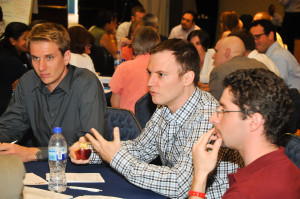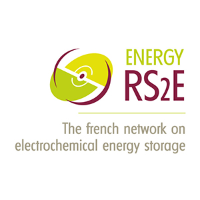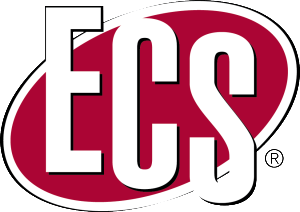
Over 100 researchers were guided through a brainstorming and working group session with the theme of improving access to clean water and sanitation in developing countries.
ECS is awarding $210,000 of seed funding to four innovative research projects addressing critical technology gaps in water, sanitation, and hygiene challenges being faced around the world.
Winners of the first Science for Solving Society’s Problems Challenge:
Artificial Biofilms for Sanitary/Hygienic Interface Technologies (A-Bio SHIT)
Plamen Atanassov, University of New Mexico, $70,000
Interfaces: Produce bio-catalytic septic cleaning materials that incorporate microorganisms removing organic and inorganic contaminants, while simultaneously creating electricity (or hydrocarbon fuel) for energy generation in support of a sustainable and portable system.
In-situ Electrochemical Generation of the Fenton Reagent for Wastewater Treatment
Luis Godinez, Centro de Investigacion y Desarrollo Tecnologico en Electroquimica SC, Mexico, $50,000
Disinfection: Study the electro-Fenton approach using activated carbon to efficiently oxidize most of the organic and biological materials present in sanitary wastewater so that recycling of the wastewater might be possible.
powerPAD
Neus Sabate, Institut de Microelectrónica de Barcelona (CSIC); Juan Pablo Esquivel, University of Washington; Erik Kjeang, Simon Fraser University, $50,000
Monitoring and Measurement: Develop a non-toxic portable source of power for water measuring and monitoring systems, which will not require recycling facilities. Using inexpensive materials such as paper, nanoporous carbon electrodes and organic redox species, the team will strive to create a biodegradable and even compostable power source.
More than MERe microbes: Microbial Electrochemical Reactors for water reuse in Africa
Gemma Reguera, Michigan State University, $40,000
Chemical Conversion: Develop microbial electrochemical reactors that harvest energy from human waste substrates using bioanodes engineered to process the waste into biofuels while simultaneously cleaning water for reuse. The microbial catalysts will be selected for their efficiency at processing the wastes, but also for their versatility to process other residential and agricultural waste substrates. This will provide an affordable, easy to operate system for the decentralized processing of a wide range of wastes for improved sanitation, water reuse, and energy independence.
(more…)
 The grant writing and review process can be daunting and difficult for young investigators to navigate. Learn tips and best practices from experts on how to successfully craft a scientific proposal for federal grants, industry partnerships, and non-profit support. A live question and answer session with the audience follows short presentations by each panelist.
The grant writing and review process can be daunting and difficult for young investigators to navigate. Learn tips and best practices from experts on how to successfully craft a scientific proposal for federal grants, industry partnerships, and non-profit support. A live question and answer session with the audience follows short presentations by each panelist.

 The French research network on electrochemical energy storage (RS2E) – a public research organization focused on batteries and supercapacitors – has just launched the
The French research network on electrochemical energy storage (RS2E) – a public research organization focused on batteries and supercapacitors – has just launched the 




